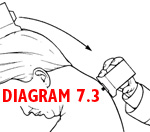The test
of any book, for me, is how much I can read of it in one sitting. Not
whether I can have the story completely swallow me up and hold me like
an overzealous lover through the night, though I value that experience,
too, which is typically the province of the novel to create a world for
us and consume our time, our consciousness, to force us to turn page after
page, proceeding linearly through, until we have to sleep because we have
to get up to work, love, court, or other responsibilities tomorrow. That's
good, yes, definitely, who doesn't want that?, but:
What I most like is for a book to
speak enough to me that I can get through no more than a story, five pages
of text, maybe, before I feel like I have to break away, either from the
intensity of the gaze or because I want to apply these stories to my own
and let them spawn. I want a book to operate on my consciousness in such
a way that it induces the sort of state that prompts my own work, drives
me to put down the book and go to the keyboard because I am primed for
something new. It's better if the story creates a kind of excruciating
pleasure where you are enjoying its work on you, but you want to get away,
you need to, and will soon, if only the spell will be broken, though you're
not willing to do that mid-story, because that disrespects the mind at
work on you as represented by these sentences.
So it is with pleasure that I read
Susan Steinberg's Hydroplane slowly, piecemeal, one story at
a time, with significant breaks between. I recommend it to you that way,
for in a lot of ways Steinberg does not seem interested in the project
of the novel (or the traditional story).
Generally this book's method is to
construct the character (and by extension the world) through fragmentary
first-person utterance, through the bursts and reversals of a voice trying
to tell us something. For instance, the action (such as it is) in "The
Garage" is narrated in 77 discrete fragments. Each is a new start,
false, often jumping backwards or forwards in time, revising or revisiting
some previous action or filling in a gap left from before, or modifying
a previous statement:
This is really a story about our father. About how he hanged himself in the garage that day. We used to say he hung himself. But the word is hanged.
That's the whole section or strophe or whatever you
want to call it. Even in this short bit we get revision, reversal, an
identifying of what the story's ostensibly about, even as it is obviously
about something other than this, quite possibly the difficulty of language
and the workings of the mind. So the unspooling of plot isn't all that
important (though there is some of the plot revealed in this way too):
what's more interesting in a Steinberg story is watching the character
become clearer, more defined, as she (it is always, or almost always a
she, often early adult or adolescent, usually sexualized, obsessive, thinking
intermittently of fucking, she as ball of intellect, dialect, and desire)
tacks around a central idea watching it come together or fall apart.
There is a downside to this method,
in that the stories' shapes are not overly varied, nor are the voices
always all that different from each other. I guess this creates a stylistic
similarity that brings the book together, but also possibly flattens (or
focuses, one could argue) its effect. And there's probably critique to
be had in the constant presence of desire (fucking, fucking, fucking)
and the possibility that this creates another sort of flatness in the
book. But I don't see much point in critique, when my first concern here
is pleasure, and there is a lot of pleasure on the sentence level,
which is the first place I feel we should start to give a shit.
Hydroplane is a more assured
project than her previous book, The End of Free Love (which I
also liked, and which worked in some ways like this one), and
offers an intense reading experience, because of the project and her vision,
her version of story. I can't say how it reads cover to cover
since I found it impossible to read in that way, and besides it comes
on strong enough to probably make it tough going to read more than a story
or two at a time. Devotees of more straightforward types of fiction might
find this difficult, though that's a lame reason to shy away from powerful
fiction. The power of the voice here is dazzling, virtuoso at times, and
has much to offer any sort of reader or writer.
So think of it like this: Hydroplane
as seed, sourdough starter, amino acids stewing. There is sufficient power
in Steinberg's sentences, each one like a little big bang creating its
own consciousness or echo, to push me or you to the keyboard. Which is
a pretty big victory from my point of view. [AM]
